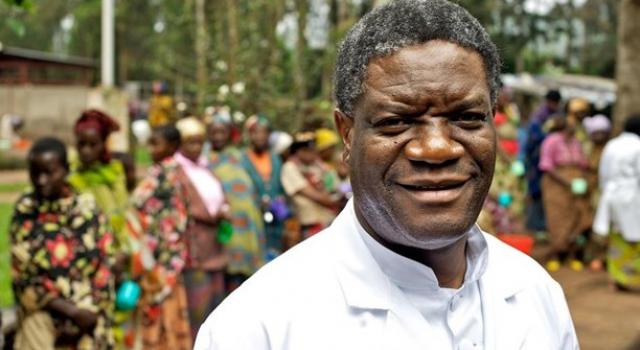Barring any unforeseen circumstances, Oscar-nominated actor, Djimon Hounsou, will kickstart shooting the much-anticipated biopic ‘Panzi’ this summer. He is set to portray the role of the 2018 Nobel Peace Prize winner, Denis Mukwege, in the film that will be helmed by actress-turned-director Marie-Helene Roux, Variety reports.
63-year-old Mukwege, a renowned Congolese gynaecologist and surgeon, has helped thousands of women and girls who have been victims of rape and sexual abuse at the hands of rebel forces in the Democratic Republic of Congo since the beginning of the civil war in the early 90s.
He founded the Panzi Hospital in the South Kivu province in 1999 to provide free and comprehensive care for female victims of rape and other forms of sexual violence during the conflict.

Mukwege was jointly awarded last year’s Nobel Peace Prize with Iraqi Yazidi human rights activist Nadia Murad for “their efforts to end the use of sexual violence as a weapon of war and armed conflict.”
1divided, a production company, acquired the exclusive rights to the life and story of Mukwege and his colleague Guy-Bernard Cadière. The two doctors have been working together to end sexual violence against women in Congo.
They co-wrote the book “Panzi”, which was published in 2014. The book, according to Variety, “chronicles what they have witnessed and experienced at the hospital, with heartfelt testimonies from victims.”

Hounsou, a Beninese-American actor and model who is best known for his Oscar-nominated performances in “Blood Diamond,” and “In America” will headline “Panzi.”
The film will be produced by Cynthia Pinet at Paris-based 1divided Films. Last October, it was announced that the film was in casting and scheduled to start shooting this summer in Central Africa.

From October 12 to 18, 2018, Hounsou and Mukwege spent seven days together in Bukavu Hospital, where the former was able to share the daily life of the doctor to “immerse himself in his personality and transcribe it to the best on screen.”
“If by his heart we can get people to understand the suffering of others and act then I believe that it’s the greatest thing you can do. Djimon has the capacity and I’m glad it’s him!,” Mukwege said.
“Panzi”, which is the second feature film written and directed by Roux, will mark Hounsou’s return to non-Hollywood material.
Mukwege, popularly known as the ‘rape surgeon’, became the 23rd African and first Congolese to ever win the Nobel Peace Prize last October. The prize was last awarded to Africans in 2011; Ellen Johnson Sirleaf and Leymah Gbowee of Liberia.
Mukwege has received scores of honours including Europe’s top human rights prize – Sakharov Prize – and three nominations for the Nobel Peace Prize for his service and fight against sexual violence.
He was also named by TIME magazine as one of the world’s 100 most influential people in 2016. His hospital treats over 46,000 girls and women with gynaecological injuries, about half of them, victims of sexual violence.
Mukwege has been very vocal in the DRC where he called for a change in the country’s governance system. He re-emphasized this during a speech at the United Nations in 2012 where he condemned the government’s passive response to the violence against women.
Despite the numerous support he gained from the public for his vociferous nature, he narrowly escaped an assassination attempt in 2012 that claimed the life of his guard who took the bullet in his place.
Mukwege went into exile in Europe but later returned to a rousing welcome the following year to help his struggling hospital to stay open.
The life of the “rape surgeon” has been documented in the film, “The Man Who Mends Women”, and a book.










